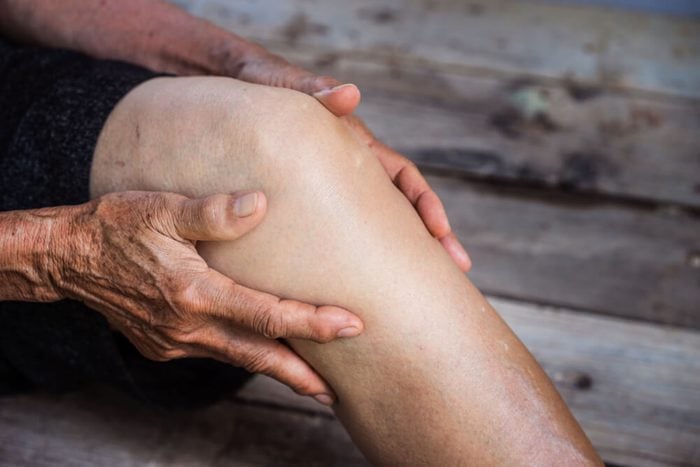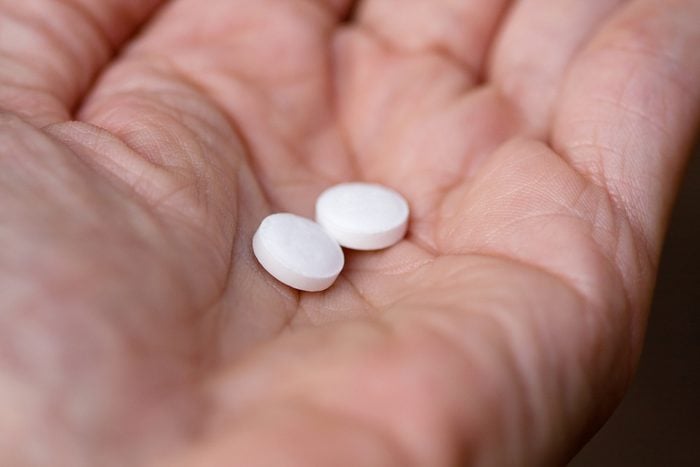
What causes muscle pain?
You know that playing tennis all weekend will leave you sore on Monday or that putting in that extra tough workout in the gym is going to make you pay later when going downstairs (oh, your quads!). When you perform activity above and beyond what your body is accustomed to, “a byproduct of energy use is produced, called lactic acid, which is a chemical that causes soreness,” explains George Kannankeril, MD, a physical medicine and rehabilitation doctor at NorthShore University HealthSystem in Chicago. Lactic acid usually dissipates in about an hour, but delayed onset muscle soreness can last for one or two days.

But it should go away
Muscle soreness is likely normal if you can pinpoint the reason for the ache (like you did a bunch of bicep curls yesterday) and if it dissipates over time. The pain should clear up after a couple days, or with one to two weeks at most, says Dr. Kannankeril. In the meantime, here are the best ways to treat muscle pain.

When to worry
Has muscle pain been lingering longer than two weeks? Is it a sharp pain versus discomfort or aching? Is it limiting your ability to carry out your normal day-to-day tasks? These are all symptoms that should tip you off that there may be something more going on. If this is happening, make an appointment with your doctor, advises Dr. Kannankeril. (Learn how to use a pain scale to assess your pain.)

It may be fibromyalgia
Fibromyalgia is a rheumatologic condition causes pain and tenderness throughout the body, as well as fatigue and sleep problems, notes the American College of Rheumatology (ACR). You may also be able to point to an emotionally stressful situation that happened prior to the onset of pain, explains Dr. Kannankeril. “Fibromyalgia causes very specific patterns of pain, including on both sides of the body and above and below the waist,” he says.

It can be arthritis
You may think of arthritis as affecting the joints, but you can also feel it in your muscles. The simple function of muscles is to contract or relax. “When there’s pain in an area, muscles will automatically contract as a protective measure,” says Dr. Kannankeril. If you have arthritis in your shoulder, for instance, your shoulder may go into painful muscle spasms.

It could be an infection
You’ve tried muscle soreness home remedies but nothing is easing the pain. What’s more, the sore area is red or inflamed and you have a fever. Your doctor may want to evaluate you for a possible infection, especially if there’s no reason (like starting marathon training) to have muscle pain in the first place.

It may be Lyme disease
The bite of a black-legged tick may transmit Borrelia burgdorferi, bacteria that often causes the hallmark bullseye-like rash. The problem is that the rash doesn’t always appear, so you have to be aware of the other early symptoms, including flu-like fever, fatigue, stiff neck, and aches. If you experience any of these and you’ve been hanging out in possible tick-laden places, such as hiking trails or campsites, talk to your doctor.

It could be rhabdomyolysis
Extreme workouts like CrossFit are trendy right now, but there’s a real danger of overdoing it: rhabdomyolysis, (dubbed rhabdo for short), a condition in which muscle tissue breaks down and releases a protein called myoglobin into the bloodstream, possibly causing kidney damage. If muscle stiffness and aches are accompanied by weakness and tenderness and dark urine, call your doctor ASAP or seek emergency treatment.

It may be an inflammatory condition
If you’re older than 65, your doctor may evaluate you for inflammatory muscle conditions, like polymyalgia rheumatica, says Dr. Kannankeril. PMR involves aching and stiffness in the upper arms, neck, lower back, and thighs, notes the ACR. Symptoms can appear overnight and you may find that you suddenly have trouble getting dressed without help or that you can’t get in and out of your car. The cause is unknown and diagnosis can be tough; corticosteroids can help alleviate the stiffness that’s sidelining you.

You could have the flu
If you have the flu, you may be hit with a sudden fever, aching muscles, chills and sweats, headache, fatigue, congestion, and a sore throat. Inflammatory proteins called cytokines break down muscle proteins, prompting soreness. If you’re at high risk for complications of the flu (for example, you’re 65 or older or are pregnant), see your doctor within 48 hours—you may be able to get an antiviral drug that can help you get better up to two days faster.

It may be a medication side effect
Unfortunately, medications that are supposed to be keeping you well may be the reason you feel so awful. A doctor will rule out other potential causes; if the Rx is believed to be the culprit through a medical history or lab tests, they may consider prescribing a new drug within the same class or a different one, explains Dr. Kannankeril.

What to tell your doctor
There may be more to muscle pain than what meets the eye. “The funny thing about muscle pain is that it can accompany other painful conditions,” says Dr. Kannankeril. In short: Tell your doctor about any other symptoms that you’re currently experiencing or that may have started around the same time as the onset of your aches and pains. This includes fevers, fatigue, headaches, night sweats, trouble sleeping, constipation, or diarrhea. “Talk about any symptom that’s out of the ordinary for you,” he says. These are the pain symptoms you should never ignore.

